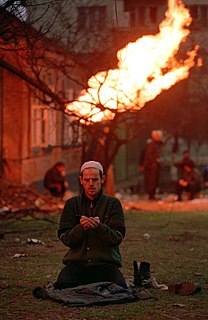 W
WA civil war, also known as an intrastate war in polemology, is a war between organized groups within the same state or country. The aim of one side may be to take control of the country or a region, to achieve independence for a region, or to change government policies. The term is a calque of Latin bellum civile which was used to refer to the various civil wars of the Roman Republic in the 1st century BC.
 W
WAn ethnic conflict is a conflict between two or more contending ethnic groups. While the source of the conflict may be political, social, economic or religious, the individuals in conflict must expressly fight for their ethnic group's position within society. This final criterion differentiates ethnic conflict from other forms of struggle.
 W
W"The Forgotten War" (capitalized) most often refers to:
 W
WGuerrilla warfare is a form of irregular warfare in which small groups of combatants, such as paramilitary personnel, armed civilians, or irregulars, use military tactics including ambushes, sabotage, raids, petty warfare, hit-and-run tactics, and mobility, to fight a larger and less-mobile traditional military.
 W
WA proxy war is an armed conflict between two states or non-state actors which act on the instigation or on behalf of other parties that are not directly involved in the hostilities. In order for a conflict to be considered a proxy war, there must be a direct, long-term relationship between external actors and the belligerents involved. The aforementioned relationship usually takes the form of funding, military training, arms, or other forms of material assistance which assist a belligerent party in sustaining its war effort.
 W
WA religious war or holy war is a war primarily caused or justified by differences in religion. In the modern period, debates are common over the extent to which religious, economic, or ethnic aspects of a conflict predominate in a given war. According to the Encyclopedia of Wars, out of all 1,763 known/recorded historical conflicts, 123, or 6.98%, had religion as their primary cause. Matthew White's The Great Big Book of Horrible Things gives religion as the primary cause of 11 of the world's 100 deadliest atrocities. In several conflicts including the Israeli–Palestinian conflict, the Syrian civil war, and the wars in Afghanistan and Iraq, religious elements are overtly present but variously described as fundamentalism or religious extremism—depending upon the observer's sympathies. However, studies on these cases often conclude that ethnic animosities drive much of the conflicts.
 W
WA war of succession or succession war is a war prompted by a succession crisis in which two or more individuals claim the right of successor to a deceased or deposed monarch. The rivals are typically supported by factions within the royal court. Foreign powers sometimes intervene, allying themselves with a faction. This may widen the war into one between those powers.
 W
WTotal war is warfare that includes any and all civilian-associated resources and infrastructure as legitimate military targets, mobilizes all of the resources of society to fight the war, and gives priority to warfare over non-combatant needs.